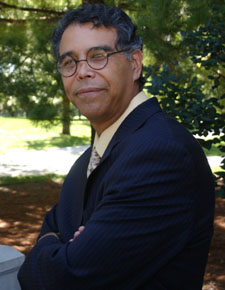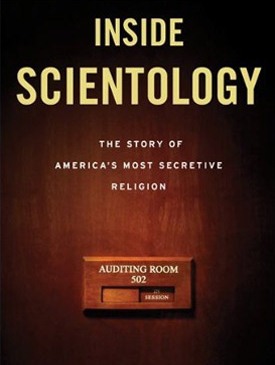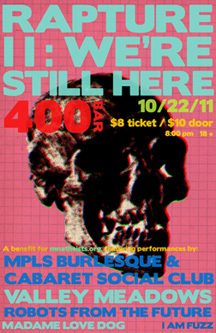By Eric Jayne
The Minnesota Atheists Burnsville Book Club recently discussed Janet Reitman's book Inside Scientology: The Story of America's Most Secretive Religion. After reading Reitman's investigative report many of us at the book discussion discovered the violent history, marketing campaigns, private rituals, and unique vernacular that not only contributed to make Scientology America's most secretive religion, but also quite possibly America's most miserable religion. Reitman's book was so intriguing that I was compelled to visit the local Scientology office in St. Paul to see real-life Scientologists and grab some free proselytizing literature for book club attendees.
The first part of Reitman's book focuses on the biography of L. Ron Hubbard. The reader learns that Hubbard was a successful and ambitious 1930s pulp fiction magazine writer in his 20s before he became a sailor in the U.S. Navy during World War II. After being discharged from the Navy in 1945, Hubbard adopted many esoteric mystical beliefs about the mind and body from Jack Parsons—an eccentric acquaintance he roomed with who practiced occultist magic.
.
Read more: Inside Scientology: The Story of America's Most Secretive Religion
Remember May 21st, 1988, when the ground quaked, planes fell from the sky, flames roared over the Earth, and heathens repented in their last remaining seconds?
Er, wait . . .
No, it was September 7th, 1994 when virulent outbreaks devastated entire populations, continents were swallowed by the oceans, trumpets sounded,
Um . . .
Okay, it was May 21st, 2011, when boils . . .
Hmm.
.
Read more: Rapture and Debaptism Party: Saturday, October 22
 New laws to prevent courts from considering Islamic laws in their decisions have been proposed in half of the states. Last November in Oklahoma, a ballot measure to that effect passed with a 70% margin. The Council on American-Islamic Relations (CAIR) immediately challenged the new law, arguing that it violates the Establishment Clause of the Constitution, which forbids the government to favor one religion over another. U.S District Court Judge Vicki Miles-LaGrange ruled in their favor, blocking implementation. Although the measure did not mention Sharia, the ballot campaign left no doubt that Islamic law was its target. Supporters warned voters that Muslims were perpetrating a stealth program to undermine America by supplanting our law with Sharia. The case has moved to a panel of judges from the 10th Circuit Court of Appeals.
New laws to prevent courts from considering Islamic laws in their decisions have been proposed in half of the states. Last November in Oklahoma, a ballot measure to that effect passed with a 70% margin. The Council on American-Islamic Relations (CAIR) immediately challenged the new law, arguing that it violates the Establishment Clause of the Constitution, which forbids the government to favor one religion over another. U.S District Court Judge Vicki Miles-LaGrange ruled in their favor, blocking implementation. Although the measure did not mention Sharia, the ballot campaign left no doubt that Islamic law was its target. Supporters warned voters that Muslims were perpetrating a stealth program to undermine America by supplanting our law with Sharia. The case has moved to a panel of judges from the 10th Circuit Court of Appeals.
Lawyers for the Oklahoma Attorney General filed documents with the court defending the referendum’s constitutionality, arguing that “(t)he measure bans, equally, all laws from other nations or cultures, including, but not limited to international law and Sharia law.”
.
Read more: George Kane's News and Notes
 Christians have a habit of opposing positive social change, until it occurs, at which point they take credit for it. (Years from now, you can expect them to take credit for legalizing same-sex marriage.)
Christians have a habit of opposing positive social change, until it occurs, at which point they take credit for it. (Years from now, you can expect them to take credit for legalizing same-sex marriage.)
Many Christian scholars have argued that reliance on Biblical principles eventually led to the abolition of slavery by Western civilization. Our October speaker, Dr. Hector Avalos, will show that it was the abandonment of Biblical authority that had a much greater influence on ending a horrific institution that had lasted thousands of years.
The presentation will focus specifically on how Frederick Douglass, the well known African American abolitionist, represented the shift away from using the Bible, and increasingly toward secular humanism to support abolitionist rationales.
.
Read more: Who Ended Slavery in America? Christianity and Secularization in Context
By August Berkshire
 Last month we were graced with the presence of one of the nation’s top atheist bloggers and speakers: Greta Christina. I use the word “graced” in the good (non-religious) sense of the word, as Greta is one of the most gracious people I have ever met.
Last month we were graced with the presence of one of the nation’s top atheist bloggers and speakers: Greta Christina. I use the word “graced” in the good (non-religious) sense of the word, as Greta is one of the most gracious people I have ever met.
Greta’s presentation was called “Atheist Anger?” I had asked her to combine two of her talks into one for us, and she was nice enough to do so. The first talk was “Why Are You Atheists So Angry?” and it is based on one of the most well-known posts in the atheist blogosphere: Atheists and Anger.
The second talk that she fused was “Diplomats vs. Firebrands” about the different strategies atheists take. It made sense to me that after she talked about why our anger towards religion was justified, that she also talk about what we could do with that anger.
.
Read more: President's Column - Greta Christina: A Diplomatic Firebrand
 The Minnesota Atheists Burnsville Book Club recently discussed Janet Reitman's book Inside Scientology: The Story of America's Most Secretive Religion. After reading Reitman's investigative report many of us at the book discussion discovered the violent history, marketing campaigns, private rituals, and unique vernacular that not only contributed to make Scientology America's most secretive religion, but also quite possibly America's most miserable religion. Reitman's book was so intriguing that I was compelled to visit the local Scientology office in St. Paul to see real-life Scientologists and grab some free proselytizing literature for book club attendees.
The Minnesota Atheists Burnsville Book Club recently discussed Janet Reitman's book Inside Scientology: The Story of America's Most Secretive Religion. After reading Reitman's investigative report many of us at the book discussion discovered the violent history, marketing campaigns, private rituals, and unique vernacular that not only contributed to make Scientology America's most secretive religion, but also quite possibly America's most miserable religion. Reitman's book was so intriguing that I was compelled to visit the local Scientology office in St. Paul to see real-life Scientologists and grab some free proselytizing literature for book club attendees.


 New laws to prevent courts from considering Islamic laws in their decisions have been proposed in half of the states. Last November in Oklahoma, a ballot measure to that effect passed with a 70% margin. The Council on American-Islamic Relations (CAIR) immediately challenged the new law, arguing that it violates the Establishment Clause of the Constitution, which forbids the government to favor one religion over another. U.S District Court Judge Vicki Miles-LaGrange ruled in their favor, blocking implementation. Although the measure did not mention Sharia, the ballot campaign left no doubt that Islamic law was its target. Supporters warned voters that Muslims were perpetrating a stealth program to undermine America by supplanting our law with Sharia. The case has moved to a panel of judges from the 10th Circuit Court of Appeals.
New laws to prevent courts from considering Islamic laws in their decisions have been proposed in half of the states. Last November in Oklahoma, a ballot measure to that effect passed with a 70% margin. The Council on American-Islamic Relations (CAIR) immediately challenged the new law, arguing that it violates the Establishment Clause of the Constitution, which forbids the government to favor one religion over another. U.S District Court Judge Vicki Miles-LaGrange ruled in their favor, blocking implementation. Although the measure did not mention Sharia, the ballot campaign left no doubt that Islamic law was its target. Supporters warned voters that Muslims were perpetrating a stealth program to undermine America by supplanting our law with Sharia. The case has moved to a panel of judges from the 10th Circuit Court of Appeals. Christians have a habit of opposing positive social change, until it occurs, at which point they take credit for it. (Years from now, you can expect them to take credit for legalizing same-sex marriage.)
Christians have a habit of opposing positive social change, until it occurs, at which point they take credit for it. (Years from now, you can expect them to take credit for legalizing same-sex marriage.) Last month we were graced with the presence of one of the nation’s top atheist bloggers and speakers: Greta Christina. I use the word “graced” in the good (non-religious) sense of the word, as Greta is one of the most gracious people I have ever met.
Last month we were graced with the presence of one of the nation’s top atheist bloggers and speakers: Greta Christina. I use the word “graced” in the good (non-religious) sense of the word, as Greta is one of the most gracious people I have ever met.